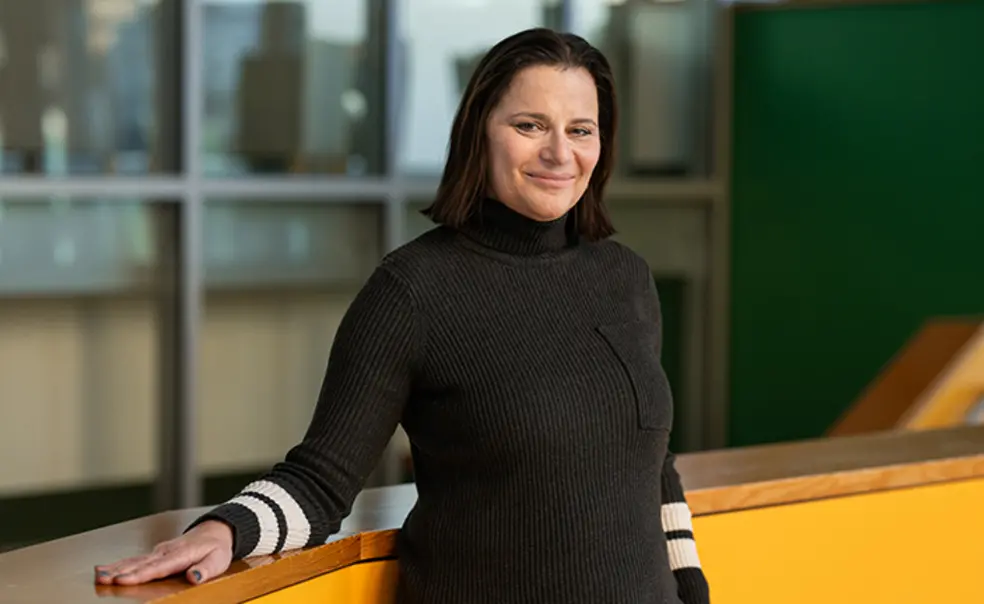The Whole Student: Reimagining Student Mental Health at Princeton
“We, as a community of adults who have been in student shoes, can help to normalize help-seeking”
This is the first edition of The Whole Student, a column written for PAW by Jess Deutch ’91 about student mental health at Princeton.
On a cold, snowy afternoon this January, I opened the door to Campus Club and headed up the stairs for a Wintersession workshop on well-being. Two students ahead of me were chatting casually about whether they’d ever been in this building. “It’s just meeting space,” one of them said.
Campus Club had been my eating club, and is now administered by the Office of the Dean of Undergraduate Students. The building is used for official activities and meetings, and houses the Coffee Club, which aspires to be the most inclusive space on campus, where student baristas serve coffee to students, faculty, staff, and campus visitors.
As I settled into the upstairs library, the phrase “just meeting space,” took hold in my brain. Wasn’t that a humble way of describing our whole campus? There is one thing most Princeton alumni agree upon, even if they didn’t know it while they were in the throes of matriculation: meeting one another — planned, happenstance, formal, informal; classmates, teammates, club members, faculty, staff, alumni — is the best and most enduring gift we are given during our education.
And yet. With all the gifts and vast resources available to them, Princeton students report feeling so much pressure to perform, so much worry about the future, and so much to do. They might forget how transformative “just meeting space” can be.
The conversation was still on my mind as I sat down to write this, my first column for PAW about student mental health at Princeton. As a member of the Class of 1991 who has worked in several capacities at Princeton over many years (winter reader for the Office of Admission; associate director for Health Professions Advising; and most recently, associate director, student-athlete services in Athletics), I have had the unique privilege of viewing the Princeton student experience from multiple vantages. The throughline of my work at the University has been providing support to students doing hard things.
PAWcast: Jess Deutch ’91 Talks with Calvin Chin, director of Counseling and Psychological Services
I come to conversations around student mental health and well-being with a practiced professional belief that we need to listen to what students tell us. Personally, as alumni, parents, and community members (I raised two children with my husband Ted Deutsch ’91, and I served on the Princeton Public Schools Board of Education from 2017-20), I believe we need to ask ourselves how we are connecting the dots between young people’s early experiences, the ups and downs of the college journey, and the ways in which we might better prepare future alumni to thrive at Princeton and beyond Fitzrandolph Gate. A world that for the current crop of students has already involved a pandemic, constant social unrest, and political uncertainty at the highest levels.
Scanning The Daily Princetonian and reading the pages of this magazine, you might be confused by two seemingly contradictory notions: Students say they are “too busy” to use the many counseling resources Princeton offers, while Counseling and Psychological Services reports full utilization of their available appointments. What’s actually going on? I believe both are true — many students are choosing to study nonstop when a counseling session or an hour of sleep would be more fruitful. But others are seeking support; they just aren’t comfortable telling their peers they are doing so. They don’t have to, of course. But we, as a community of adults who have been in student shoes (albeit ones we couldn’t get delivered via Amazon), can help to normalize help-seeking and share the more nuanced truths of our lives so that even at Princeton, struggle and support can take place in the light of day.
In this new feature I’ve been asked to write, we will consider how an environment that places a premium on excellence can also attend to aspects of being human, like vulnerability, and I’ll highlight stories that amplify our connections to each other as well as a sense of belonging at our alma mater. We can rethink history with evolving understanding. We can reimagine tired narratives that no longer serve us or the students who are yet to come. And we can find ways to underline one of the most important elements of anyone’s Princeton’s experience: that you are not alone.
Jess Deutsch ’91, EdM, LSW is an education adviser in Princeton, N.J. Her career and current practice focus on promoting well-being in the pursuit of higher education.












No responses yet